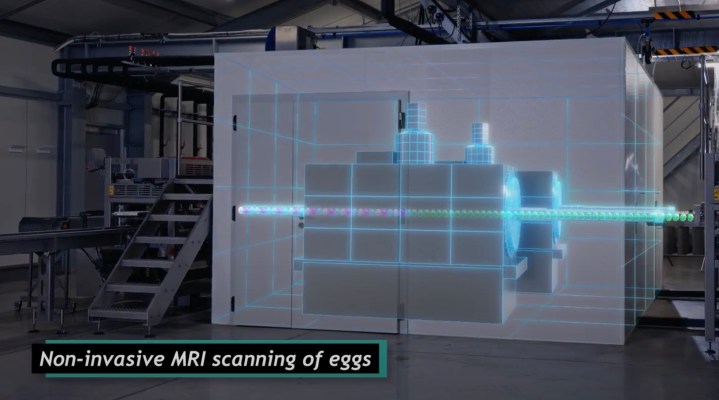Germany, France and Italy are among the countries which last year enacted laws to stop the practice of culling male day-old chicks, because, as they do not lay eggs, they are considered surplus to requirements. This was not just because of the waste created but also out of animal welfare and ethical considerations. The laws were literally designed to encourage tech companies to come up with ways to determine the gender of chicks before they hatch.
Hyperspectral imaging, which accurately detects the gender of chicks based on plumage color on day 13 of incubation, is one such technology now being employed. A fully automated system called “CHEGGY” is one such system used in commercial hatcheries.
The systems can detect different aspects of eggs, like freshness, broken yolks and cracks in the shell, up to about 97% accuracy in some instances.
But here’s the problem: It’s slow.
So Munich-based startup Orbem, born from PhD research into MRI tech, set out to fix the problem and speed up the process.
An industrial MRI scanner is combined with an AI-based platform, which enables hatcheries to determine the sex of an egg in a contactless and non-invasive manner. Orbem claims to be able to scan an egg in one second, much faster than existing processes.
Some 20 million eggs scanned later, Orbem claims to have even entered into profitability.
The company, which launched in 2019, has now raised a €30 million ($31.8 million) Series A funding round led by 83North. The round was joined by new investor La Famiglia and existing investors The Venture Collective and Possible Ventures.
The company had raised €10 million previously, half of it equity-free money, such as via research grants from the European Union and the German government.
The founders met while doing their PhDs at the Technical University of Munich, and spun Orbem out of the institution.
Dr. Pedro Gómez, co-founder and CEO of Orbem, says they focused on poultry producers initially because “poultry has has a ton of problems. They currently wastes billions of eggs simply because they don’t know what’s inside, wasting unfertilized eggs or killing one-day-old males which is actually unethical and unsustainable. And there are regulations now stopping this. So that was the first reason. The second reason from a technology point of view was a demonstration that we can build these systems that are so fast, accessible and simple that they even work in a traditional industry like poultry.”
However, Orbem doesn’t plan to stop there. By imaging nuts, for instance, it could detect parasites or “grade the nuts inside of the shell, allowing our customers to do stuff like dynamic pricing,” says Gómez.
Orbem’s product can also scan other biological samples, such as plant species, and — even — the human body.
An MRI of construction materials could, for instance, ensure structural integrity in biodegradable materials.
It’s clear the marriage of MRI and AI is going to be a trend to watch in coming years.
In the last three years, there have been over 710,000 “AI for MRI” patents filed and granted in the medical devices industry, according to GlobalData.
And the AI in medical imaging market could be worth $29.8 billion, globally, by 2032 according to Allied Market Research.
And AI is now being used to improve MRI scans in humans, replacing less effective and invasive methods.
Commenting on this trend, Oliver Schoppe, as principal at UVC Partners, which is familiar with Orbem, said: “AI is obviously a bit overheated from a VC perspective but I see a lot of substance as well… In contrast to most startups out there, Orbem has a sustainable competitive differentiation: their strong technical vertical integration down to the hardware of MRI.”
So expect more MRI+AI startups soon…
